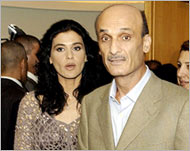Lebanese government wins approval
Lebanon’s parliament has voted confidence in the new government, endorsing a programme that vows balanced ties with Syria but does not mention a UN demand that Hizb Allah disarm.

The cabinet, led by Fuad Siniora, finance minister under assassinated ex-premier Rafiq al-Hariri, won the support of 92 members of the 128-seat assembly on Saturday.
Fourteen voted against and two abstained, Speaker Nabih Berri announced.
A score of deputies were not present at the session of the parliament, elected recently and dominated for the first time since the 1975-90 civil war by opponents of Damascus.
The lawmakers voting against belong to the opposition bloc led by Michel Aoun, also a foe of Syria, who has demanded an explicit government commitment to UN resolution 1559.
Withdrawal
Syria‘s pullout from Lebanon in April fulfilled part of the measure, but Hizb Allah and Palestinian factions reject its other main demand – the dismantling of all militias in the country.
|
“We want good, correct relations based on respect … and the balanced interests of the two countries” Fuad Siniora |
Siniora, who won the vote after a sometimes stormy three-day debate, said he would travel to Damascus on Sunday to try to improve relations strained since the Syrian troop withdrawal and the anti-Syrian street protests that preceded it.
“We want good, correct relations based on respect … and the balanced interests of the two countries,” he told the assembly.
One of his main objectives will be to persuade Syria to loosen tough new border controls that have brought Lebanon‘s overland exports to a near-standstill in recent weeks.
Damascus says the curbs are a security measure, but many Lebanese see them as retaliation for the wave of anti-Syrian sentiment unleashed in Lebanon by al-Hariri’s killing in a February bombing in Beirut. Syria denied any part in the attack.
Old wounds
The parliamentary debate, carried live on television, sometimes rubbed old civil war wounds, reviving issues that were suppressed during Syria‘s 15-year postwar domination of Lebanon.
Christian leaders demanding an amnesty for Lebanese members of a defunct Israeli-allied militia now living in Israel clashed verbally with Muslims who insist collaborators must be punished.
 |
|
Christian Samir Geagea was |
Fearing reprisals or punishment if they stayed, 6000 former militiamen of the South Lebanon Army fled with their families to Israel when Israeli troops withdrew in 2000. More than half have trickled back, but many others remain in exile.
Parliament this month approved an amnesty for jailed Christian general Samir Geagea and hundreds of Sunni Muslims suspected of links to a failed Islamist revolt in 2000.
Some Christian deputies want a similar amnesty for Lebanese who worked with the Israelis, infuriating Muslim deputies, especially those of Hizb Allah, the anti-Israeli Shia Muslim group that fought the 22-year Israeli occupation of the south.
Hizb Allah, the only Lebanese group to retain its weapons openly after the civil war, has vowed to keep them as a deterrent against Israel. Palestinians permitted to keep light arms inside refugee camps are also reluctant to give them up.
Lebanese opinion is divided, some viewing the UN resolution as a US-inspired attempt to disarm enemies of Israel, others arguing that Hizb Allah should now stick to politics and let the state take full control of its territory.